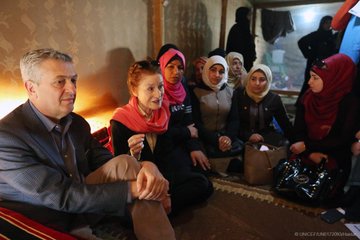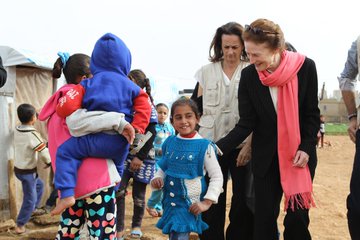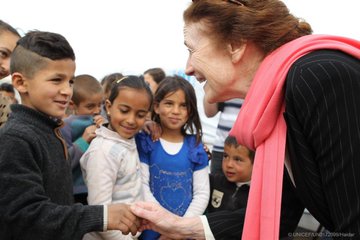
Two UN agency chiefs are pledging to accelerate work to expand refugee children’s access to protection, education, clean water and sanitation, as the COVID-19 pandemic continues to spread across the globe.
“The needs of refugee children have become even more acute,” said Henrietta Fore, Executive Director of the United Nations Children’s Fund (UNICEF), and UN High Commissioner for Refugees Filippo Grandi in a joint statement on Monday.
They emphasized that the 12.7 million child refugees and 1.1 million asylum seekers driven across borders by conflict and violence are among those with the most limited access to COVID-19 prevention services, testing and treatment.
The pandemic also presents a range of additional threats to displaced children, from increased hunger to stigmatization, as fear spreads through communities.
Ripples of impact
In their statement, the agency chiefs stressed that both COVID-19 and measures to contain its spread are likely to have negative consequences for the safety and education of displaced children – which were precarious even before the outbreak of the virus.
Going to school was already a daily challenge or impossibility for many displaced children around the world, with only half of all school-aged refugee children enrolled. Now, more displaced children are likely to be out of school for a prolonged period and some might never return.
Experts have warned that in many cases, children are going without meals or clean water because of school closures. Increasing rates of neglect, abuse, gender-based violence and child marriage are also likely as families experience further socioeconomic hardship.
Protecting uprooted children
In an urgent message on 16 April, UN Secretary-General António Guterres also voiced concern about the well-being of the world’s children, appealing to families and leaders to protect young people whose lives have been upended by COVID-19.
He spotlighted a new UN report which finds that the pandemic is having significant effects on children, such as making it harder for them to access standard health care in health facilities that are increasingly overwhelmed.
In addition, the report warns that families living on reduced incomes are often forced to cut back on food and essential health expenditures – particularly affecting children, women and breastfeeding mothers – and that hundreds of thousands of children may miss out on vaccines to prevent against measles, polio and other preventable diseases.
“With the pandemic placing so many of the world’s children in jeopardy, I reiterate my urgent appeal [to] protect our children and safeguard their well‑being,” said the UN chief.
Blueprint for action
The pandemic is bringing a fresh urgency to existing plans to expand refugee children’s access to protection, education, clean water and sanitation.
UNICEF and UNHCR are pushing forward with their blueprint for joint action – launched by the two organizations in January 2020 – with initial work targeting a range of priority countries.
Together, they have pledged to double the number of refugee and returnee children with access to education; ensure their access clean, sustainable and environmentally sound water and sanitation services; address protection concerns; and identify barriers to inclusion in national systems.
Coronavirus Portal & News Updates
Readers can find information and guidance on the outbreak of the novel coronavirus (2019-nCoV) from the UN, World Health Organization and UN agencies here.For daily news updates from UN News, click here.
UNICEF’s agenda for action to protect the most vulnerable children during the pandemic also includes a specific call for global solidarity in support of displaced children, including those who live in crowded camps where social distancing is not feasible.
“Like all children globally, refugee children deserve a fair chance in life, and to see their rights fully realized,” the agency heads said in their joint statement. “Though their lives have been disrupted by violence, displacement and now a pandemic, their chances for a dignified future will be bolstered if they have equitable access to the support and services they need.”
https://news.un.org/feed/view/en/story/2020/04/1062182



